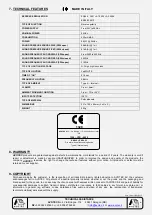
2- INSTALLATION
To remove the cover from the base pressure should be applied on the side (points
).
Fixing the base to the wall is done by using the quarries passers indicated in the drawing below
(points
).
The cover is fixed to the base with the slots
(points
and
).
The cover is locked to the base by tightening the two screws 2.6 x 10 in correspondence of the holes of the point
(
).
The cable entry can be done either at the rear
that at the side
;in this latest case are arranged recesses for
fixing:
-
Cable gland 20mm IP65.
-
Cable gland PG 13,5 IP65.
N.B. DO NOT USE the pre-break on the upper side of the fire alarm visual & sounding device.
3- ACTIVATION
The activation of the DOA V device is done applying the “positive power +” and ”negative power – “ to its clamps "+ " and "- ", of
the terminal block
MA
while in the rest condition is applied to clamps the reverse voltage.
In the case in which the central unit goes into alarm will reverse the inverting output, activating the fire alarm visual & sounding
device.
In the condition of cutting of the power cable the central unit will recognize the change of state of the line thanks to the fact that
will not read more the end line resistance value "R" indicated at point 1.1.1 "TERMINAL BLOCK MA” and will turn it into alarm but
without causing the activation of the fire alarm visual & sounding device.
4- SYNCHRONIZATION
The series DOA V has input synchronism "S" (see section 1.1.1 "TERMINAL BLOCK MA"). By connecting together the inputs "S"
the flashing of "n" panels will SIMULTANEOUS avoiding effects of disorientation.
P.S. Where devices visual and sound that you want to synchronize, they had different power supplies, must be connected
together the negative power supply (0Vdc GND).
5- MAINTENANCE
To ensure a correct functioning over time is recommended once a year the activation of the fire alarm visual & sounding device
and a verification to the correct fixing of the same to the wall.







